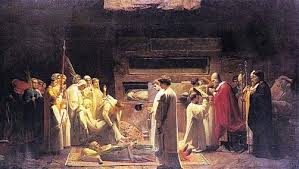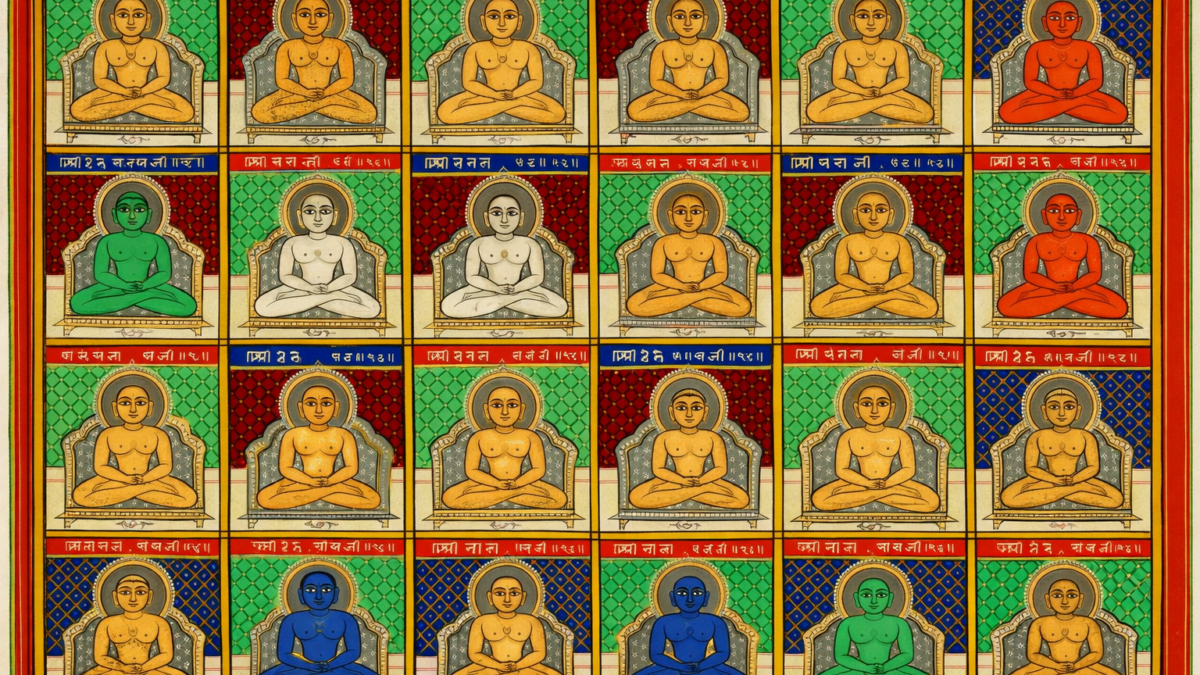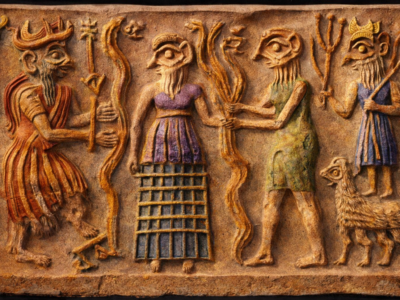
Early Christianity became one of the most widespread spiritual and ideological paradigms, which engulfed the mood of the citizens of the Empire. The hope of the soon coming of the Messiah, the establishment of a kingdom of love and justice, good and universal good was a clear idea carried by the first Christian preachers. At the same time, the preaching of Jesus of Nazareth, Christ the Messiah, did not have a clear outline, a permanent closed canon for understanding who Jesus Christ really was: whether he was a simple man, the Son of Mary and Joseph, or the Son of God or identical with God. Father. Due to the fact that the written Christian scriptures, which enjoyed universal authority among all the followers of Jesus of Nazareth, did not exist, the result of this phenomenon was a good basis for new heresies, trends, currents and differences. Dozens of new prophets, leaders, and so on have given rise to a wide field for interpretations and exegetical problems.
In the first century AD, Gnostic trends began to gain momentum, the most notable of which were the Ebonites, the Judean Gnostics with certain elements of Christianity. The exact time of occurrence of ebionites (in some variants of «evionites») is not known for sure. Even among the early historians of Christianity, there are many inaccuracies in the descriptions of the life of the Ebionites. Thus, Quintus Tertullian mentions that the founder of this Gnostic movement was a certain Ebion. Modern Western scholars of early Christian movements, including Bart Hermann, refute this fact due to erroneous assumptions of Tertullian himself.
Difficulties also arise with understanding what ebonyism really is. According to the famous historian of Christianity F. Bruce, ebonyism was a kind of «intermediate link» between the synagogue and the church.
Comparing all the facts known about the Ebionites, we can identify several main pillars of the doctrine of this religious vision:
- Unquestionable authority of the written Law with scrupulous observance of religious rules and regulations (without taking into account the authority of the Oral Torah)
- The doctrine of the «adoption» of Jesus Christ, according to which Jesus was an ordinary Man of Mary and Joseph, a preacher of Good, Truth and Justice
- Rejection of Paulineism. The Apostle Paul was recognized by the Ebionites as a self-proclaimed apostle, an apostate
- The successor of Jesus Christ was considered to be James the Righteous, not the Apostle Peter, as is customary in classical Christianity.
Due to speculative approaches to descriptions of ebionism, many facts about them today contain many subjective considerations. Most authors believe that the Ebionites are Jews who have departed from certain religious practices, including sacrificial practices. Others considered them zealous and fanatical followers of the thoughtless practice of many legal practices. Moreover, many insisted that the Ebionites rejected religious mysticism and tried to justify their own beliefs only in a rational way. For example, some Methodius of Olympus claimed that the Ebonites believed that all the prophets spoke only of themselves and not of supernatural divine revelation. At the same time, Epiphanius of Salamis mentions excessive devotion to rituals and concentrations on some strange ritual parts, in particular «ritual bathing».
Some of the practices often attributed to the Ebionites include the annual Meal in memory of Christ’s Death and His feat on the eve of Easter with the use of fresh bread and water. According to scholar Hans Joachim-Shops, the enduring doctrine of ebionyism is due to the influence of essays. After the Roman siege of Jerusalem around 70 AD. The close contacts of the Ebionites with the Essays were traced, given the fact that the Essays did not adopt Paulineism and the views of Christianity on the Messiah Christ and His divine nature until the end of their existence.
Some of the practices often attributed to the Ebionites include the annual Meal in memory of Christ’s Death and His feat on the eve of Easter with the use of fresh bread and water. According to scholar Hans Joachim-Shops, the enduring doctrine of ebonyism is due to the influence of essays. After the Roman siege of Jerusalem around 70 AD. The close contacts of the Ebionites with the Essays were traced, given the fact that the Essays did not adopt Paulineism and the views of Christianity on the Messiah Christ and His divine nature until the end of their existence.
Asceticism was also manifested in some aspects of everyday life. Thus, from some testimonies of Epiphany about the life of the Ebionites, it follows that most of them (if not all) were vegetarians. In the Ebionite Gospel, John the Baptist is presented as a prophet who ate honey cakes instead of locusts, as the latter is a product of animal origin. Apart from the Ebionite version of the Gospels, no similar edit is found in other manuscripts. Professor Jace Tabor suggests that the nature of Ebionite veganism is linked to Noahite reasoning about antediluvian life, so-called pre-Sinai revelations, from righteous Enoch to Noah. An interesting hypothesis about Ebionite vegetarianism is the abolition of sacrifice.
The Christology of Ebionism is far from Pauline and modern Orthodox Christianity. Of course, the views of Jesus Christ rejected his divine nature, some — his immaculate conception. In their sermons, the Ebionites preferred to emphasize the humanity of Christ, his social and humane ideas, rather than his divine or sometimes messianic status quo. Jesus in the interpretation of ebionism is the human Son of Mary and Joseph. However, reading Eusebius and Theodoret, we can conclude that there was a separate sect of Ebionism, which did not agree and believed in the immaculate conception of Jesus. However, in this case, they would have to use different versions of the Gospel, which, according to researchers, is likely unlikely. Omitting the first two chapters of the Gospel of Matthew, the Ebionites argued that through righteous living, Jesus was able to accomplish a mission that no one could accomplish better than himself because he was superior in his righteousness. According to the historian of early Christian movements, sects and heresies Bart Hermann, Jesus in ebionism — «a perfect sacrifice that went to the cross, was raised from the dead by God and raised to heaven.»
An equally special view of the Ebionites is the faith in James, the brother of Christ as His true successor, the true Nazarene, and the true elder of the Jerusalem community. According to researchers such as Gerd Ludemann, Pierre Antoine Bernheim, and Will Durant, ebonyism is an insistence on the dynasticism and succession of the ministry of Jesus Christ. At least the first three leaders of the Jerusalem Church were considered authorities by the Gionite Gionites. At the same time, a clearly defined concept of the family dynasty cannot be traced in the sermons of the Ebionites, or in the mentions of their apologists or opponents. Historian Richard Baukham argues that this hypothesis is unprovable. Moreover, as the researcher Baukham himself points out, the Jerusalem church professed Christology much higher than the Ebionites, at least considering Christ as the Son of God and by no means inferior. In addition, it should be added that of the Acts of the Apostles, Jerusalem Christians accept Paul as an «apostle of the Gentiles», which is clearly contrary to the views of the Ebionites. And, in fact, the mission of the Apostle Paul was rejected by the latter not earlier than at the end of the I — beginning of the II century.
In fact, as far as Paul is concerned, extreme opposition does not apply to him, mainly in his views on the nature of Christ. The main antithesis of the ebionites is the claim to refute the Law and the whole controversy over circumcision, which Moses enshrined in the Law. Epiphany’s writings mention that Paul was of Greek descent to marry the daughter of an Israeli high priest, but withdrew after the latter rejected him.
It is difficult to give a clear historical assessment of the disappearance of ebonyism as a phenomenon. It is known that after the end of the Roman-Israeli war, Christianity, which in its preaching supplanted all competing religious communities, defeated ebonism. Researcher Khayyam McCobby insists that the persecution of Jews and Christians, including the marginalization of certain Christian and Jewish groups, has led to the decline of the authority of Ebionite teachings. After the defeat and expulsion of the Jews from Jerusalem, many Jewish Christians who fled to Pella stopped practicing Jewish rites and joined the main Christian church. Those who continued to adhere to circumcision and Jewish customs were considered heretics and apostates.
Thus, the centers of ebonyism were gradually relocated to other areas. The above-mentioned Epiphanius of Cyprus in 375 mentions the settlement of the Ebionites in Cyprus, who lived here until the V century. Theodoret of Cyprus does not mention any references to the life of the Ebionites in his historical mentions and descriptions.
Despite the sharp decline of ebonyism, some communities appear in some historiographical sources until the emergence of Islam in the VII century. In the later period, information about them is vague, and thus we can identify them only on certain grounds, in particular in the works of historian Abd al Jabbar ibn Ahmad, as well as in the «Book of Travels» by Rabbi Benjamin of Tudela. Twelfth-century Islamic scholar Muhammad al-Shahrastani describes a group of Jews who accepted Jesus’ prophetic mission while following traditional Jewish rites. Many Islamic historians are even inclined to believe that the influence of the Ebionites on the prophetic mission of Jesus laid the foundation for the future of Islamic doctrine.
Despite the disappearance of ebionism, some aspects of it are reflected in the beliefs of some of the newest Christian and non-traditional Muslim and Jewish groups.
Ph.D. Eugene Raspopov
To contact the author, you can contact the e-mail address: odger998@gmail.com or subscribe to your Instagram account: raspopov_eugene










